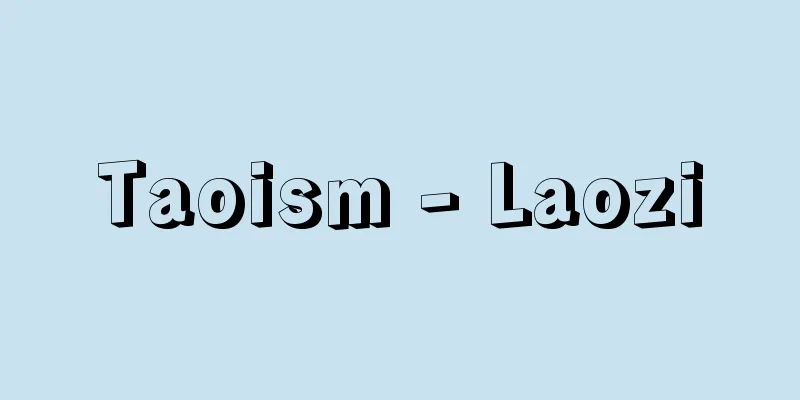Taoism - Laozi

|
Traditional Chinese thought. The name combines Laozi and Zhuangzi, and sometimes refers to Taoist thought, just as Confucianism is called the teachings of Confucius and Mencius. However, it also has a strong meaning as a unified thought that combines Laozi and Zhuangzi, which is rather important. Although Laozi and Zhuangzi have similarities, there are clear differences. Laozi has a strong interest in reality and also considers secular successism, while Zhuangzi has a state of religious liberation that transcends reality without being bound by it. These were merged by later students of Zhuangzi, and the term "Laozi" first appeared in the Huainanzi, and eventually, during the Wei-Jin period (3rd century), Laozi-Zhuangzi thought became popular. Commentaries on the "Laozi" were written from Zhuangzi's point of view, and many commentaries on the "Zhuangzi" also incorporated Laozi's words, but the three books, which also included the "Yi" (Chinese Book), were called the Three Xuan (Sangen) and respected. During this period, the ideas of Laozi and Zhuangzi were established as the philosophy of "nothingness" by Wang Bi (226-249). The aristocrats liked to use the words of Laozi and Zhuangzi in their discussions, and sometimes used them as a basis for resistance to authority, but for the most part they found personal comfort in their transcendental state of life. After this, they provided a foundation for the idea of seclusion, and were also used in connections with religion and the arts. [Osamu Kanaya] Source: Shogakukan Encyclopedia Nipponica About Encyclopedia Nipponica Information | Legend |
|
中国の伝統思想。老子(ろうし)と荘子(そうし)をあわせた名称で、儒教を孔孟(こうもう)の教えとよぶように、道家(どうか)思想をさしていうときもある。ただ老荘を折衷して一つにまとめられた思想としての意味も強く、それがむしろ重要である。老子と荘子の思想は、もともと類似性はありながらもはっきりした違いがあり、老子では現実関心が強くて世俗的な成功主義も視野のなかにあるが、荘子では現実にとらわれないでそれを超え出る宗教的解脱(げだつ)の境地がある。それが荘子の後学によって融合され、『淮南子(えなんじ)』で初めて「老荘」という語が現れ、やがて魏晋(ぎしん)の時代(3世紀)になって、老荘思想の流行時代となった。『老子』の注が荘子の立場から書かれ、『荘子(そうじ)』の注も老子の語を交えて多くつくられたが、それに『易(えき)』を加えた三書を三玄(さんげん)とよんで尊重することも行われた。老荘の思想はこの時代に王弼(おうひつ)(226―249)によって「無」の哲学として成立した。貴族たちはその清談のなかで老荘の語を好んで用い、ときに権力に対する抵抗のよりどころともしたが、おおむねはその超俗的な境涯に個人的な慰安をみいだした。この後、隠遁(いんとん)思想に支柱を与え、宗教や芸術とのかかわりのなかでも生かされていくことになる。 [金谷 治] 出典 小学館 日本大百科全書(ニッポニカ)日本大百科全書(ニッポニカ)について 情報 | 凡例 |
>>: Old and young people's association - Rosokai
Recommend
Ritual property - Saishizaisan
This refers to family trees, memorial tablets, Bud...
Deadweight
...But in the case of warships, where there is no...
Yoshida Isoya
Architect. Born in Nihonbashi, Tokyo. Graduated f...
Disguise - Gisou
2007 was a year of food fraud, with "fake&quo...
Fern
Ferns are a group of polyphyletic vascular plants...
Navigation System with Time and Ranging Global Positioning Satellite
...Due to inaccuracies that occur in gyros and ac...
Book of Ain
…He was the teacher of Shibawayh, who left behind...
Capricorn - Capricorn
〘Noun〙① A line of latitude on Earth that is 23 deg...
Placito Capuano (English spelling)
… In Italy, where the tradition of using Latin as...
Takuji Ohte
Poet. His early pen name was Yoshikawa Soichiro. ...
Gennosuke Yokoyama
A Meiji-era newspaper journalist. A pioneer of so...
Crow - Ukyu
〘Name〙 The Chinese name of the plant "Nanking...
Prairie pine (English spelling)
...There are said to be about 40 species in the L...
Pellipario, N. (English spelling) PelliparioN
… At that time, Renaissance humanism was on the r...
Jersey spinning wheel
...Then the direction of the thread is changed to...









